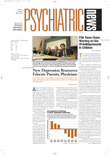Hank is a sports fanatic. What sport does he like best? “Whatever is currently playing!” he replies. However, his wife confides that he does have a favorite—golf.
“I don't see what he sees in the game,” she sighs.
Golfers, however, see a lot. And so do some psychoanalysts who attended the session “Psychoanalytic Perspectives on Teaching, Learning, and Playing Golf” at the American Psychoanalytic Association meeting in New York City in January.
Participants included Richard Harris, M.D., a Chicago psychoanalyst in private practice; Howard Katz, M.D., a psychiatry instructor at Harvard Medical School and a training and supervising analyst at Boston Psychoanalytic Society and Institute; and Phil Lebovitz, M.D., an assistant clinical professor of psychiatry at Chicago Medical School and a training and supervising analyst at Chicago Institute for Psychoanalysis. A professional golfer who teaches at Tamarack Country Club in Greenwich, Conn., Bob Farrell, also attended the session and contributed thoughts on the subject. Farrell is the third generation in his family to teach golf. His grandfather is a U.S. Golf Association Open champion.
Golf is an effort to master one's environment, Katz reported. The drive to master one's environment is fundamental to building an ego. Therefore, a big part of one's self-respect is involved in playing golf.
Emotional equilibrium is also crucial for the game, Lebovitz pointed out. Thus, when psychological issues intrude on one's golf game, they can really mess it up, several anecdotes reported during the session revealed.
One concerned a high school student, “Jim.” He was anxious about his putting ability and wanted to quit playing golf. During analysis, Jim revealed that his father wanted him to go to college on a golf scholarship, yet he did not want to do so and feared telling his father that. His conflict over the matter was interfering with his golf game.
The other anecdote concerned Lebovitz. Once he was accompanied on a round of golf by a friend who was dying from cancer. “I played as though I were a rank beginner,” Lebovitz lamented. “I had a slice like I hadn't had for years. I chopped up the ground; I went into sand traps and couldn't get out of them.”
Lebovitz attributed his miserable performance to sadness over his friend's imminent demise, as well as to the round reminding him of his father. The last time Lebovitz and his father had golfed together, his father was dying from cancer.
Building a Golf Alliance
Golfers who want to improve their game may work with golf teachers, who then combine golf-stroke assistance with some psychology, said Lebovitz.
Lebovitz cited as an example, Jim Suttie, Ph.D., a golf professional and teacher from whom Lebovitz has taken some golf lessons. Suttie videotapes a student's strokes, then shows the student how they compare with the strokes of a professional golfer. During his most recent golf lesson with Suttie, Lebovitz said, “one side of the screen was me; on the other side was Tiger Woods.”
Suttie also evaluates the student's learning style—is the student a visual or auditory learner?—and attempts to establish a relationship with the student to relax him or her. It is akin to an analyst trying to establish an analyst-patient alliance, Lebovitz observed. Farrell employs a similar tactic with students. During the first 10 minutes of a lesson, he tries to get students to relax. “You can tell if they are tense,” he said.
Suttie likewise uses a clever psychological ploy that he calls “going through the back door to teach.” Lebovitz calls it “disarming a narcissistic defense against learning.” The ploy consists of convincing a student that a golf-stroke change was his or her idea, not the teacher's; this way the student is more receptive to it.
Still other golfers who want to improve their game may visit sports psychologists, Lebovitz said. Sports psychologists usually push positive thinking. Their typical advice: “Stay in the present; golf is a game of confidence.” And certainly the power of positive thinking in golf should not be underestimated. What matters isn't whether the swing is right, but whether you believe in it, Farrell pointed out. Some students have beautiful swings but do not play golf well, he said.
Where Psychodynamics Can Help
Nonetheless, sports psychologists generally do not deal with psychological conflicts that may be interfering with a golfer's game, an analyst participating in the session said, and that is where analysts can especially help.
A case cited by Lebovitz illustrates the point. A 32-year-old woman,“ Sandy,” entered analysis because of embarrassing outbursts of anger in social settings. However, during analysis her golf game deteriorated, and for a while she talked about nothing else. Then she had a dream about looking for a lost golf ball. Her analyst helped her realize that she was searching for her mother, who had died while she was in college. This realization helped her work through unresolved grief, and her golf game improved.
Still another example of how analysts can help psychologically conflicted golfers can be seen in the case of 15-year-old “Jason.” Whenever Jason played golf poorly, he would explode in anger at himself, and his fury would lead to an even worse golf performance. So Jason sought sports psychology help from Katz.
In addition to doing analysis, Katz engages in some sports-psychology work. Although such work is quite different from psychoanalysis—it often involves visiting an athlete at a practice facility—Katz applies what he knows about people and relationships from analysis in that work.
For example, while Jason played nine holes of golf, Katz walked along. As he observed what Jason was doing, he asked him questions about what he was thinking. Katz came to realize that Jason's outbursts of anger over playing poorly were due to his obsession with perfection, and that this obsession arose from his upbringing.
The way most golfers can improve their game, however, is by risking failure, Farrell stressed. Yet the biggest problem that golf students have is the fear of failure, a golf teacher told Katz. And such anxiety, Lebovitz added, is akin to an analytic patient's experimenting with new forms of intimacy or some other behavior change.
“It is going to feel wrong until it feels right,” an analyst attending the session commented. “That is how you grow in any domain, that is how you change for the better.”
Moving from one level of golf to another is like taking a step forward in child development, Harris said. Golfers who want to improve their game must“ develop themselves psychologically as well.” ▪

